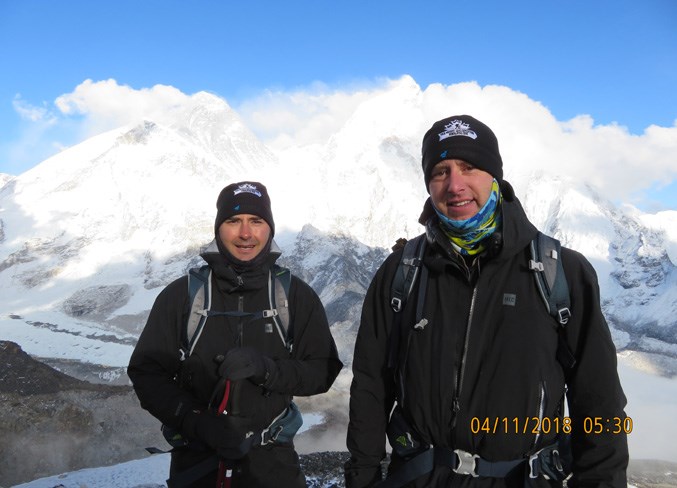The road to recovery isn’t easy for ill or injured Canadian military soldiers.
Transitioning into civilian life following retirement can be a difficult journey, which is why the True Patriot Love Foundation is helping soldiers find the way.
For 18 days, soldiers and civilians took part in an expedition to the Himalayas, where they faced one of their toughest challenges yet.
“That was the hardest thing in my life that I did,” said Sgt. Stephane Pichette, a 28-year member of the Canadian Forces currently based out of 4 Wing Cold Lake.
But it wasn’t just a physical challenge, it also pushed the 21 men and women mentally and emotionally.
By pairing up eight soldiers and 13 civilians, the True Patriot Love Foundation hopes to build bonds that will last a lifetime.
Their challenge was to climb to the Mount Everest base camp, sharing their stories along the way.
For Pichette, it was an opportunity to prove to himself that regardless of a medical condition, which has caused him to be released from the military, he could still do anything.
“I needed a challenge to prove to myself that regardless of a medical condition, I can still be good at something,” he expressed.
Pushing himself even further, Pichette and a smaller group climbed 2,000-feet past the Everest base camp to the peak of Labouche East.
“We went to the Everest base camp, that’s a challenge. You need to be in shape, but it was the part after that, where we climbed to Labouche East. We were at 50 per cent oxygen, and it was very mentally challenging. It’s six hours of walking. You take two steps and you’re out of breath,” Pichette described. “Because we’re paired with civilian people, we get to share our stories and they can share theirs. We built a partnership with them, while working as a team and facing a big challenge.”
Right by his side every step of the way was fellow 4 Wing Cold Lake member M.-Cpl. Eric Fleming, who took part in the expedition for the mentorship, and the opportunity to experience the Himalayas.
He said, “The allure for me was obviously the trip, but also the program that I was able to tap into.”
Fleming has been in the military for nearly 20 years, so the civilian world is almost “unknown.”
By being paired with a civilian for the expedition, he had an opportunity to ask questions and learn as much as he could before beginning the transition out of the military.
“The bonds you form with your mentor are amplified. You’re all put in a tough environment, you’re forced to work together towards a common goal, and you have a lot of time to take it all in and appreciate where you are and where you’re going,” Fleming expressed. “Every day was physically and mentally challenging, but in a team environment.”
According to Bronwen Evans, CEO of the national charity, they started organizing the expeditions in 2012 as a way of bridging the gap between civilian and military life.
“The thinking with that was, and this is one of the big reasons why our organization came into existence, is we felt there was a disconnect between the civilian world and the military world,” she expressed. “These expeditions are generally pretty challenging and it’s an opportunity for business people to see first-hand the challenges our soldiers are facing, but also to have a greater appreciation for the skills that they bring. When we’re in an environment that makes us uncomfortable, it’s usually the soldiers that rise to the top and take charge.”
The expedition is two-fold, not only does it help military members starting down a new path in their lives, but it also acts as a fundraiser for the True Patriot Love Foundation.
Both Fleming and Pichette were responsible for fundraising for their trip, on top of paying their way.
The money is put towards programs to help military members who are ill or injured and are retiring from the Canadian Forces.
Evans explained, “We were established in 2009, in a time when soldiers were coming back from Afghanistan and we were seeing the impact the war was having on them and their families. Since then, we’ve raised about $25-million to support military veteran families across the country in areas like mental health, physical health, rehabilitation, military children with special needs, research, those sorts of things.”
Through their expeditions, they have created the Alberta-based program Forces At Work, which has helped 147 former military members find work.
“One of the things we find, is the journey of recovery is very unique to every soldier. Overall, I would say they benefit from being part of a community that is supportive and reminiscent of their time in the military. Many of the soldiers who come on our trip, because they’ve been dealing with stress injuries like post-traumatic stress disorder, have isolated themselves. They’re not necessarily in touch with others who are going through similar challenges,” Evans said.
Pichette and Fleming would recommend the program to anyone. They agreed they both found what they were looking for, as they focused on each step of their journey.
Fleming added, “I would highlight the fact that it’s a mentorship program. That’s a two-way street. Military members have a lot of experience being in a rugged environment while a lot of civilian people don’t. They learn from us just as much as we learn from them. You have absolutely nothing to lose by signing up for a program like this, and everything to gain.”



